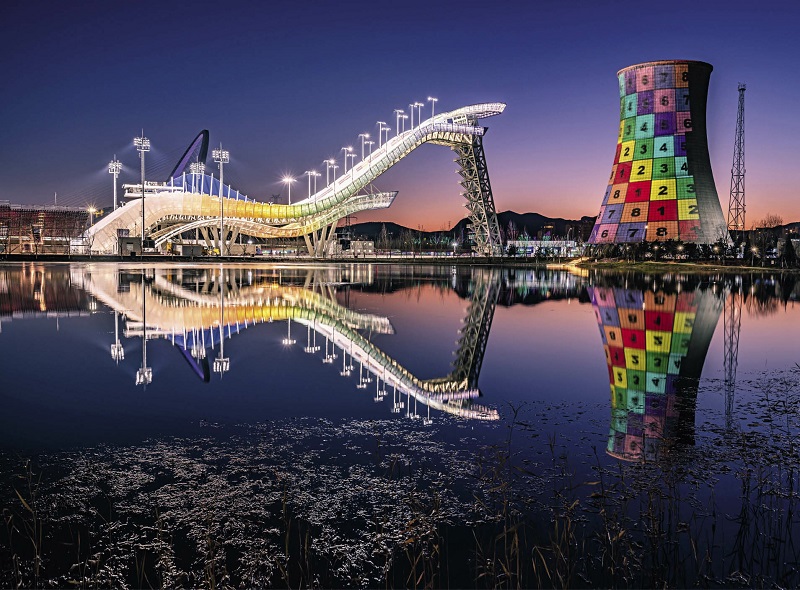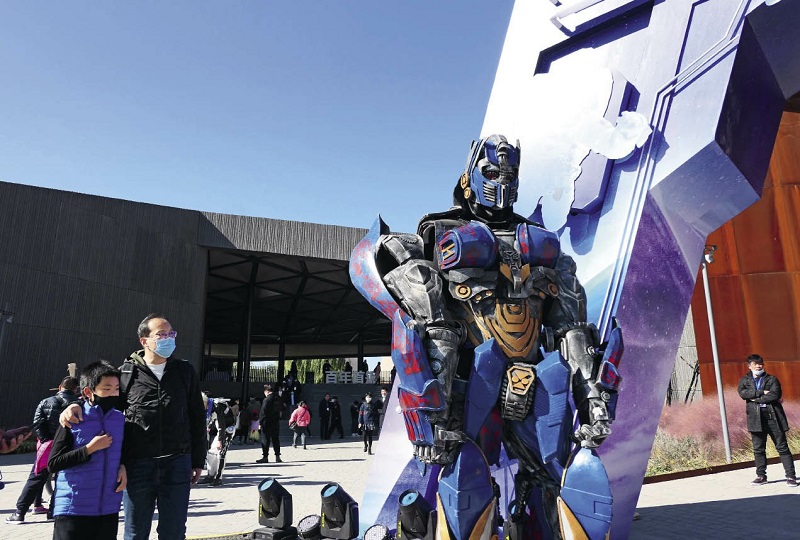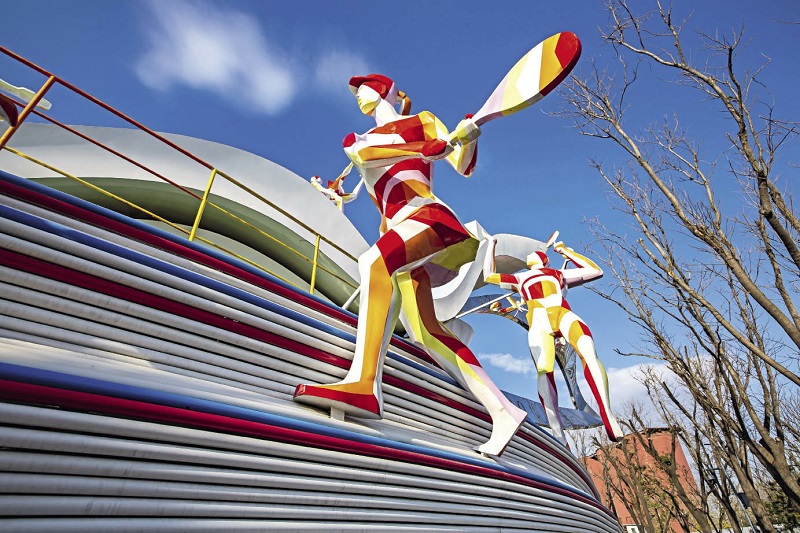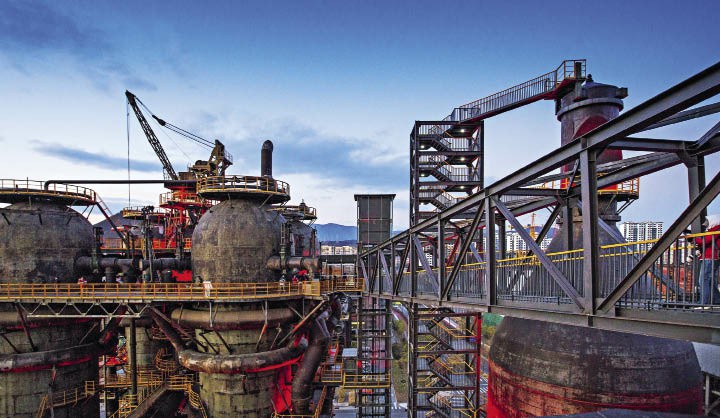
A light show of Shougang Ski Jumping Platform on December 11, 2019.
A former industrial complex lying on the west side of Beijing’s Chang’an Avenue has changed drastically over the years.
First built in 1919, the Shougang (Capital Iron and Steel) Group has witnessed the history of new China’s steelmaking industry. As the steelmaking giant relocated its manufacturing base to Beijing’s neighboring Hebei Province, the former industrial complex was vacated for new possibilities. Today, sci-fi elements, trendy sports, unmanned technology, and the footprints of the Winter Olympic Games can all be found in the renovated site. Renamed Shougang Industrial Park, it is taking on a new look.
In August 2017, President of the International Olympic Committee (IOC) Thomas Bach saw its industrial remains and praised the transformation of Shougang Industrial Park as a great idea. At the 131st IOC Session in September 2017, Bach again applauded the reconstruction of the park as an example of urban planning and renewal that has impressed the world.

Participants enjoy themselves at the 2020 China Science Fiction Conference held in Shougang Park on November 1, 2020.
A Multifunctional Venue
When the old factory halted production in December 2010, it was the end of an era, but in recent years, the place has been transformed into a high-end industrial comprehensive service area. A new landmark for the rejuvenation of the nation’s capital in the new era is emerging. It is now home to the Organizing Committee for the Beijing 2022 Olympic and Paralympic Winter Games, the World Overseas Chinese Business Innovation Center, and the National Sports Industry Demonstration Areas. A lot of events, such as Beijing TV network’s New Year galas, 2020 Beijing E-sports, and the 2020 China Science Fiction Conference, have also been held there.
In the old plant, the No. 3 Blast Furnace once was a typical production line in the smelting system. It was Shougang’s first modern large-scale blast furnace, with the capacity of exceeding 2,500 cubic meters. Transforming this furnace area into a trendy venue for fashion shows took a lot of ingenuity. According to Zhou Ting, a senior engineer of the Planning and Design Department of Shougang Construction Investment Co., Ltd., there was no reference for such a job as it was unprecedented. The design team had originally planned to use the furnace area as a museum, but they then realized that it had the possibility of being more useful as a venue for press conferences and events, and this was the direction they took.
Bo Hongtao, chief designer of the furnace renovation project, recalled that his design preparation included reading more than 20,000 drawings, repeatedly consulting the chief technician of Shougang Design Institute, and climbing on to the blast furnace. Indeed, the architectural drawings of the early industrial remains were inaccurate, and the team needed to constantly correct deviations on site. The main furnace body structure and the rust-colored steel outer surface needed to be retained, but deciding which of the original pipelines in the blast furnace to retain required a lot of investigation.
The devil is in the detail. According to Zhou Ting, the furnace was severely corroded due to age. In addition to scouring the rust with a high-pressure water gun, the team also developed a protective paint with 90 percent transparency, which allowed them to seal and retain the rusty original appearance.
Although Shougang was the pride of the industrial age, dust and noise pollution was serious at that time. For Beijing’s green development vision, the local steelmaking industry had to be transformed.

A display of colorful sports-themed sculptures in the park.
From Crane Driver to Tour Guide
Jiang Jinyu joined Shougang in 1995 and drove an overhead traveling crane in the steelworks. The crane is an indispensable large-scale lifting facility in the steelworks. It is horizontally framed in the workshop and warehouse and can be used for the lifting of steel slag, molten steel, and steel billet. As a crane driver, Jiang’s daily work took place 30 meters above the ground. In Shougang, there were many female crane drivers like Jiang. With the transformation and development of Shougang, Jiang was trained to become a guide with the Beijing 2022 Winter Olympic Games Organizing Committee.
She was quite uncomfortable when she switched to the new post. “In the past, my job was to operate equipment independently, and I only had to say a few words every day. But now being a guide, I must communicate with others, so nervousness is the most difficult thing for me to overcome,” she said. But Jiang is a suitable candidate for telling the story of Shougang as she has many personal memories of the steelworks.
Jiang knows that she is the window for others to understand the history of Shougang. “I was once very confident in the crane, and quite skilled in operating it. I was not confident with the new position at first, but now I like it very much. I decided to persevere and tell more people about the spirit and culture of Shougang,” she said. In order to be competent in her new job, she worked diligently, learning how to handle different guests and how to tell her own story to give guests a glimpse of the spirit of Shougang and what it used to be. Since 2016, Jiang has offered guide services on more than 1,600 occasions and received more than 50,000 visitors from all walks of life at home and abroad.

A winter view of the park.
A Popular Tourist Destination
Shougang Park has become one of the must visit places in Beijing. In October 2019, its east gate square was officially opened to the public, and there was an endless stream of visitors who made online appointments.
Visitors who enter from the east gate and walk north for about five minutes can enjoy the 3.2-kilometer-long Shougang Skywalk. It is the world’s longest skywalk, more than three times longer than the High Line in New York City. It is a viewing platform, a place to rest, and also get exercise. From this footpath, one can enjoy a panoramic view of the rippling lake, four iconic large cooling towers, the Shougang Big Air jump platform, as well as the New Shougang Bridge. Next to the Big Air jump platform is a former power plant being rebuilt into a Shangri-La Hotel. The six-storey building will accommodate athletes from across the world during the 2022 Winter Olympics. On the other side of the road, one can also overlook the Winter Olympic training venues.
The Big Air jump platform, resembling a high-heeled shoe, is also a landscape sculpture. It will become the world’s first Big Air jump platform for permanent use. In 2022, it will witness four Big Air Olympic gold medalists.
Past the Big Air jump platform is the iconic No. 3 Blast Furnace. Next to the furnace is the Xiuchi Lake, which was built in 1940 and was used for storing circulating water for steelmaking. After it was renovated, the aboveground section became a water landscape, and the underground section is a car park able to accommodate 855 cars and includes a circular sunken exhibition hall. When the weather is fine, the majestic furnace is reflected in the Xiuchi Lake, adding a touch of agility and softness to the industrial park. Taking a photo here has become a must for tourists.
The Starbucks coffee shop converted from a power station is also a must-see place. The surrounding buildings complement each other and blend into one, forming a unique landscape typical of the post-industrial era. Many people come here not only for coffee, but also to see the beauty of architectural design.
Transforming the Shougang complex is like weaving clothes. Just like repairing holes or worn areas in fabric, designers have added functional buildings to the former industrial complex. Many iron-making silos and stock bins have been gorgeously transformed into modern creative office space. The place, now housing the office of the Beijing 2022 Winter Olympic Games Organizing Committee, used to be 10 silos for storing iron-making raw materials. Circular holes each with a diameter of one to three meters are carved on the exterior of the silo to allow light into the building.
According to Fu Xiaoming, deputy general manager of Beijing Shougang Construction Investment Co., Ltd., seizing the opportunities brought by the Winter Olympic Games, the old factory of Shougang is accelerating its transformation and upgrading to create a new landmark for the rejuvenation of the capital city in the new era.
YE ZI is a reporter with the People’s Daily Overseas Edition.









